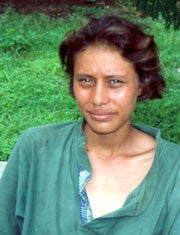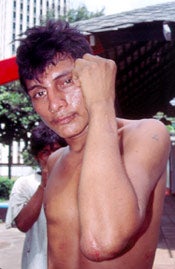News
The Poor Shall Always Be With Us
- 25 July 2002
News
Wendy Medina Sanchez was a pretty girl once. No longer. Now she looks as haggard and worn out as her unwashed second-hand clothes. Her long black hair is dull and lifeless and crawling with lice. She walks as if half asleep, slow and unsteady. As she draws near, her eyes, which look like two cigarette burns in a blanket, seem to roam around in their sockets unable to focus on anything in particular, except her baby food jar full of sniffing glue. In Latin America this is the "opium of the poorest of the poor". Wendy is addicted to the glue used by shoe manufacturers. So too are the 15 young people that comprise her street family. Ironically, they all live in a park opposite the plush Nicaraguan Parliament building.

Sitting next to me, her body odor is overpowering. Wendy literally reeks of the street. She hasn't bathed in a month. During our half hour conversation, she pulls the glue jar from the top of her grimy Harley Davidson T-Shirt at regular intervals and takes long hits from it. The glue makes her talkative.
Wendy's story is all too common in Nicaragua, as in the rest of the region. She is 23, no longer an adolescent and has been on the street since she was 13 -- a full decade of hand-to-mouth scrounging in some of the worst living conditions imaginable.
"I ran away from home at 13 after my step father raped and beat me repeatedly for two years," she pauses as if to retrieve some piece of information. "I was 11 when the abuse started," she says matter-of-factly. "I come from a small town in the interior of the country, in the province of Matagalpa". My mother blamed me for what her new husband did, so I left home. I couldn't stay there any longer."
Wendy ended up in Managua on the street with nothing but the clothes on her back and some pocket money. With only a grade school education and no skills, she was forced to turn to "occasional" prostitution to earn money. "When I was having sex, usually with truck drivers or migrant workers, they might give me a bath and occasionally some cast off clothes. Once in a while I had a roof over my head, even if it was only a tin roof."
When she started sniffing glue, her clientele changed. Instead of getting $5-10 for sex, she was doing it in parks and alleys for the equivalent of $2-3. Though Wendy knows about HIV/AIDS, her clients won't wear condoms. "I should insist," she says, "but I can't make them."

Hearing Wendy talk about her life on the street, her boyfriend of one year, Lester Mairena, ambles over and sits down next to her. He too sniffs glue and has been living rough on the street for four years, since he was 14.
"Wendy is not a bad girl, she just needs some help," he says. " I really wish I could help her get off the glue and develop a skill, but I dropped out of school when I was 9 years old. My family was very poor and they needed my help. I sold fruits on the street and did odd jobs," he explains in a quiet, sleepy voice. "But my father died a drunk when I was 11 and my mother went back to Honduras. I haven't seen her in three years."
The biggest problem for this small band of dispossessed adolescents, living a precarious existence on the mean streets of Managua, is the gangs. Last year, Lester was attacked by members of the "Death" gang. His back and arms bear silent witness to the brutal attack, which came at 3AM when he was asleep with Wendy. "They tried to rape her and I fought them, but they cut me up really bad with machetes," he says, showing off the jagged pink scars on his back, arms and legs. "If the police hadn't shown up, they would have killed me," he says.
One other girl wasn't so fortunate. Maria Mercedez is only 17 and has been on the street since she was 13. Even under the grime, she remains an attractive girl. This makes her a favorite target of the street gangs. "A few days ago," she explains in halting Spanish, "I was held down and raped by two members from the "Monsters" gang. When I resisted, they burned my hands with cigarettes."
Like Wendy, Maria was raped by her step father when she was 12. "My mother, thinking I was trying to steal her man, threw me out of the house," she says quietly.
Maria also sells her body to men for money - she usually charges no more than $2 for sex. " I try to get them to use a condom, but most refuse. If I insist, they beat me, then have sex with me anyway," she explains.
"I've been on glue since I was 14, but I want to shake the habit and learn a skill," says Maria. She would like to go to a rehab clinic but none of them will take her in because she can't afford the fees and there are no public programs that help street adolescents kick the glue habit, or give them useful skills.
Neither Wendy nor Maria blames anyone for their current condition. Both girls would like to change their lives, but don't know how, or where to go to get help. "I want to join a rehab center and stop sniffing glue," says Wendy in a rare lucid moment. "After that I want to learn a skill and earn money without having to sell my body."
Unfortunately, programs set up by the government or local NGOs haven't managed to address the needs of the growing number of street children and adolescents, abandoned first by their own families, then by society. Nicaragua has an overwhelmingly youthful population - 70% of its 5.2 million people are below the age of 30. Yet, according to Lucia Salvo, Nicaragua's Minister of Health, only one out of every 10 adolescents have access to appropriate information and health care services and one of every four pregnancies is accounted for by an adolescent girl under the age of 20.
"Clearly, we aren't addressing the varied health needs of this group," points out Ms Salvo.
Nor is the government able to do much to provide young people with the training they need for real jobs. The government claims the unemployment rate is 20%, but officials admit it's really closer to 40%, when taking into account all the young people who have dropped out of the job market altogether.
Some of those uncounted minions can be found at the local municipal dump, at the end of a washboard dirt road that winds through one of the poorest sections of the city. Here, in a scene straight off the canvas of Hieronymous Bosch a ragged army of outcasts collects anything that can be recycled from this burning landscape. Entire families, including children as young as three or four, scour the putrid heaps salvaging what they can, while flocks of black vultures jockey for position over their next rancid mouthful.
Luis Fernandez is one such rag-picker. He is 17 and uneducated. He dropped out of school at 11 to help his family. But when is father died, his mother went back to El Salvador, abandoning him to the street. He has been here for three years and doesn't have any hope of ever doing anything else. "I will probably die here," he says with resignation. "Many do, but there are always some people who want to try to make a living in this place."
No one denies that Nicaragua is a country in real trouble. "Two things are really appalling about this country," storms one local politician from the Caribbean coastal town of Bluefields. "First the government is the biggest employer here and they have a poor record of solving problems, and second is the sorry state of our young people. When a country abandons its youth, they are foreclosing on their future."
Nicaragua, of course, is not the only country that has failed to address the needs of its young people. Elsewhere in the developing world's crowded cities, ever growing numbers of abandoned children and adolescents try to eke out an existence in the face of hostile police, dangerous street gangs, sexual predators and indifferent local officials. Programs meant to help often do more harm than good, because they do not include skills building or job training. Once the programs end, so do the opportunities.
If the second Earth Summit can address some of the fundamental concerns of youth -especially job training, in league with the private sector - it will have accomplished something concrete. After all, a disproportionate number of the absolute poor are women and young people.
"All I really want is a chance for myself and my girlfriend to get a job and earn some money. We want a home," says Lester, pausing as he searches for words. "Not this excuse for life."
Contact Information:
Don Hinrichsen
Tel.: +1 (212) 297-5103
Email: hinrichsen@unfpa.org